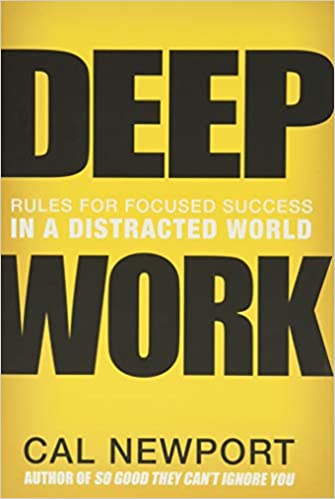About
Cal Newport’s book Deep Work is about productivity science. Cal believes that the best way to get more meaningful work done is to concentrate deeply – to focus hard on a single task without being interrupted.
The book is split into two parts.
The first explains why deep work boosts productivity and why so few people undertake it. The second section shows us how to do this and incorporate deep work into our daily routine.
Notable quotes
- “If you don’t produce, you won’t thrive—no matter how skilled or talented you are.”
- “Clarity about what matters provides clarity about what does not.”
- “Who you are, what you think, feel, and do, what you love—is the sum of what you focus on.”
- “Two Core Abilities for Thriving in the New Economy 1. The ability to quickly master hard things. 2. The ability to produce at an elite level, in terms of both quality and speed.”
- “what we choose to focus on and what we choose to ignore—plays in defining the quality of our life.”
- “As the author, Tim Ferriss once wrote: “Develop the habit of letting small bad things happen. If you don’t, you’ll never find time for the life-changing big things.”
- “if you keep interrupting your evening to check and respond to e-mail, or put aside a few hours after dinner to catch up on an approaching deadline, you’re robbing your directed attention centers of the uninterrupted rest they need for restoration”
- “If you can’t learn, you can’t thrive.”
- “To simply wait and be bored has become a novel experience in modern life, but it’s incredibly valuable from the perspective of concentration training.”
- “Ironically, jobs are actually easier to enjoy than free time, because like flow activities they have built-in goals, feedback rules, and challenges, all of which encourage one to become involved in one’s work, to concentrate, and lose oneself in it. Free time, on the other hand, is unstructured, and requires much greater effort to be shaped into something that can be enjoyed.”
- “Efforts to deepen your focus will struggle if you don’t simultaneously wean your mind from a dependence on distraction.”
- “We tend to place a lot of emphasis on our circumstances, assuming that what happens to us (or fails to happen) determines how we feel. From this perspective, the small-scale details of how you spend your day aren’t that important, because what matters are the large-scale outcomes, such as whether or not you get a promotion or move to that nicer apartment. According to Gallagher, decades of research contradict this understanding. Our brains instead construct our worldview based on what we pay attention to.”
- “Less mental clutter means more mental resources available for deep thinking.”
- “Human beings, it seems, are at their best when immersed deeply in something challenging. There”
- “The task of a craftsman, they conclude, “is not to generate meaning, but rather to cultivate in himself the skill of discerning the meanings that are already there.”
- “Once your brain has become accustomed to on-demand distraction, Nass discovered, it’s hard to shake the addiction even when you want to concentrate. To put this more concretely: If every moment of potential boredom in your life—say, having to wait five minutes in line or sit alone in a restaurant until a friend arrives—is relieved with a quick glance at your smartphone, then your brain has likely been rewired to a point where, like the “mental wrecks” in Nass’s research, it’s not ready for deep work—even if you regularly schedule a time to practice this concentration.”
- As Nietzsche said: “It is only ideas gained from walking that have any worth.”
- “In this new economy, three groups will have a particular advantage: those who can work well and creatively with intelligent machines, those who are the best at what they do, and those with access to capital.”
- “Your will, in other words, is not a manifestation of your character that you can deploy without limit; it’s instead like a muscle that tires.”
- “If you service low-impact activities, therefore, you’re taking away time you could be spending on higher-impact activities. It’s a zero-sum game.”
